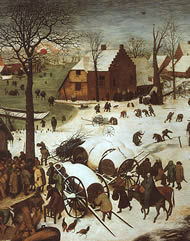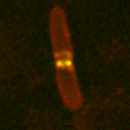
A solar slump may have chilled the Northern Hemisphere.
The flickering sun may cause rapid climate change, according to a new comparison of climate records. A 200-year cold snap 10, 300 years ago seems to have coincided with a passing slump in the sun’s activity 1 .
Svante Bjorck of Lund University in Sweden and colleagues looked at sediments in Lake Starvatn on the Faroe Islands and in the Norwegian Sea, the width of growth rings in ancient German pine trees

Without the help of fossils or any other record from the distant past, scientists have identified what they believe represents a common ancestor of all animals on Earth, a microscopic organism with key genetic traits that, until now, have been found only in true animals.
Writing in Tuesday’s Proceedings of the National Academy of Sciences, a team of scientists from the Howard Hughes Medical Institute at the University of Wisconsin-Madison reports the discovery of a key cell communication ge

A fast, sensitive laboratory test that measures the molecular components involved during the critical moment when HIV infects a normal cell has been developed.
The advance was made by researchers in the University of California, San Diego (UCSD) School of Medicine and VA San Diego Healthcare System.
Described in the December 2001 issue of the Journal of Biological Chemistry (JBC), the test makes it possible to study and design new compounds to block the action of these molecular componen

A vaccine against one of the world’s leading killers could one day be manufactured by livestock, researchers report. According to a study released today by the Proceedings of the National Academy of Sciences, scientists have developed mice that secrete malaria vaccine proteins into their milk. The purified experimental vaccine protected 80 percent of monkeys subsequently exposed to a lethal dose of the malarial parasite.
Anthony Stowers and Louis Miller of the National Institute of All

The tell-tale signature of most lasers used in everyday applications—from bar-code scanners to pen-size pointers—is a bright red glow. The color is determined by the light’s wavelength, and most lasers emit at only one wavelength. Now a new report published in the current issue of the journal Nature describes a light source measuring only tens of millimeters across that changes color according to temperature.
To make the new laser, Diederik Wiersma and Stefano Cavalieri of the European

Sloshing proteins help bacteria find their waists.
Chemical waves may help a bacterium to divide by pinpointing its middle, according to a new model of protein interactions 1 .
Bacteria such as Escherichia coli multiply by dividing. Bacterial division (called binary fission) is simpler than human cell division (mitosis). Human cells erect scaffolding to transport components to the two nascent daughter cells at either end; bacteria just pinch in two.

– new calculation confirms standard model of particle physics. Contribution of hadronic vacuum polarization determined with unprecedented accuracy. The magnetic moment of the muon is an important precision parameter for…
Technique may prevent formation of unwanted waves that siphon off needed energy. Heating plasma to the ultra-high temperatures needed for fusion reactions requires more than turning the dial on a…

An international team of astronomers, led by researchers from the Astronomical Observatory of the University of Warsaw, have identified a new class of cosmic X-ray sources. The findings have been…

How deubiquitinases USP53 and USP54 cleave long polyubiquitin chains and how the former is linked to liver disease in children. Deubiquitinases (DUBs) are enzymes used by cells to trim protein…

Conceptual blueprint to analyze experimental catalyst data. Machine learning (ML) models have recently become popular in the field of heterogeneous catalyst design. The inherent complexity of the interactions between catalyst…

Antibody that Neutralizes Inhibitory Factors Involved in Nerve Regeneration Leads to Enhanced Motor Function after Acute Spinal Cord Injury. Researchers at 13 clinics in Germany, Switzerland, the Czech Republic and…

How simulations help manufacturing of modern displays. Modern materials must be recyclable and sustainable. Consumer electronics is no exception, with organic light-emitting diodes (OLEDs) taking over modern televisions and portable…

“Neurons that fire together, wire together” describes the neural plasticity seen in human brains, but neurons grown in a dish don’t seem to follow these rules. Neurons that are cultured…

The quest for sustainable energy solutions has been a major focus of scientific research for decades. Solar energy, a clean and renewable source, has emerged as a promising alternative to…

With a processing speed a billion times faster than nature, chip-based laser neuron could help advance AI tasks such as pattern recognition and sequence prediction. Researchers have developed a laser-based…

New technology could remotely identify various types of plastics, offering a valuable tool for future monitoring and analysis of oceanic plastic pollution. Researchers have developed a new hyperspectral Raman imaging…

Artificial Intelligence (AI) has established a strong presence across industries, large and small. The “VoBaKI” research project has empowered small and medium-sized enterprises (SMEs) with an innovative tool to independently…